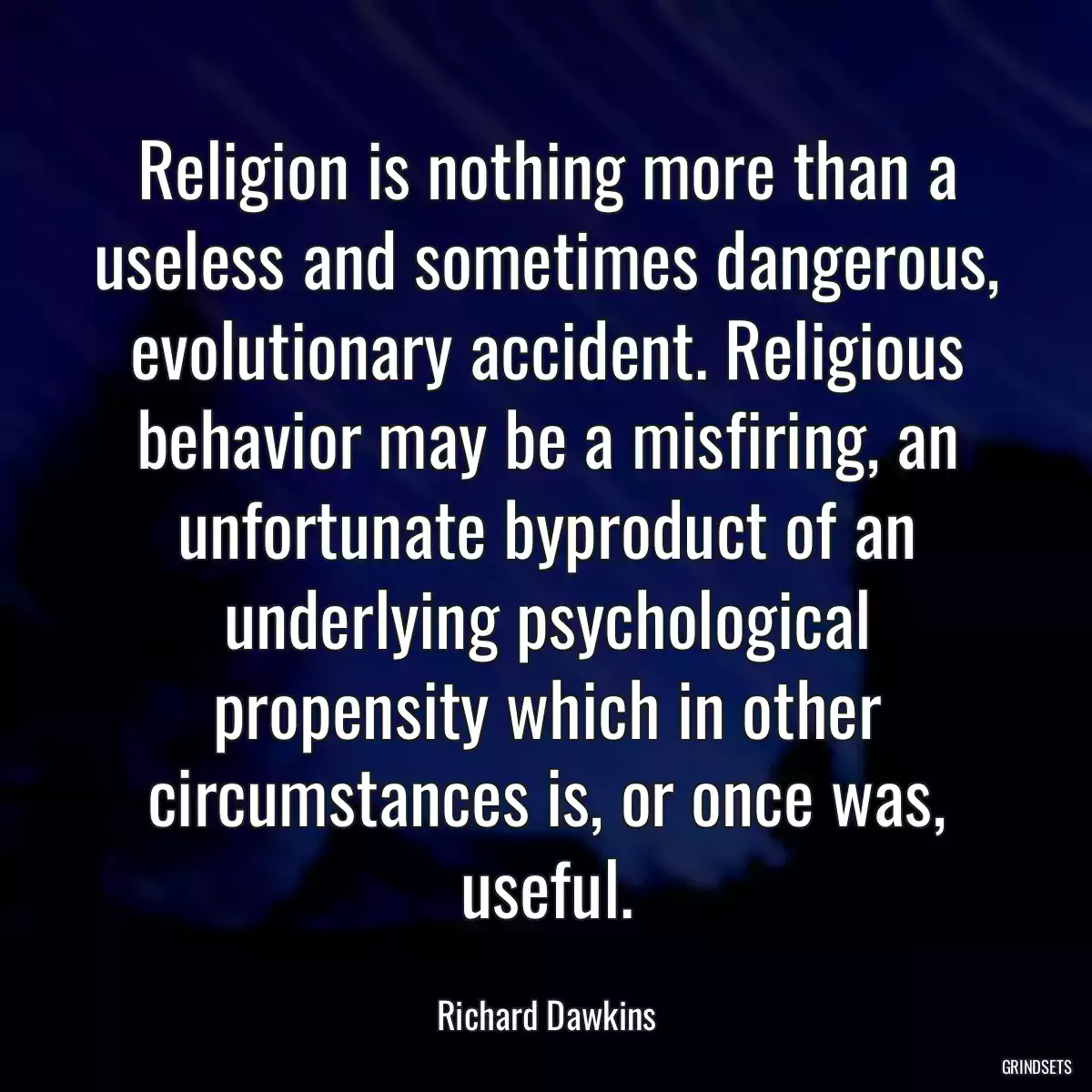
Quotes Richard Dawkins - page 3
Find dozens of Richard Dawkins with images to copy and share.

It is universally accepted that an admission of atheism would be instant political suicide for any (U.S.) presidential candidate.
We accept that people are irrational for good Darwinian reasons. But I don't think we should be so pessimistic as to think that therefore we're forever condemned to be irrational.
As long as we accept the principle that religious faith must be respected simply because it is religious faith, it is hard to withhold respect from the faith of Osama bin Laden and the suicide bombers
You may also like
I accept that there may be things far grander and more incomprehensible than we can possibly imagine.
I suppose if you look back to your early childhood you accept everything people tell you, and that includes a heavy dose of irrationality - you're told about tooth fairies and Father Christmas and things.
No doubt soaring cathedrals, stirring music, moving stories and parables, help a bit. But by far the most important variable determining your religion is the accident of birth.
I think by the age of about nine I recognized that there were a lot of different religions, and it was an accident I happened to be born into one of them. If I had been born somewhere else, I would have had a different one. Which is a pretty good lesson, actually. Everyone should learn that.
If you have a faith, it is statistically overwhelmingly likely that it is the same faith as your parents and grandparents had. No doubt soaring cathedrals, stirring music, moving stories and parables, help a bit. But by far the most important variable determining your religion is the accident of birth. The convictions that you so passionately believe would have been a completely different, and largely contradictory, set of convictions, if only you had happened to be born in a different place.

Theology is a non-subject. I'm not saying that professors of theology are non-professors. They do interesting things, like study biblical history, biblical literature. But theology, the study of gods, the study of what gods do, presupposes that gods exist. The only kind of theology that I take account of are those theological arguments that actually argue for the existence of God.
Presumably what happened to Jesus was what happens to all of us when we die. We decompose. Accounts of Jesus's resurrection and ascension are about as well-documented as Jack and the Beanstalk.
People who criticize The Selfish Gene like that often haven't read it. The selfish gene accounts for altruism toward kin and individuals who might be in a position to reciprocate your altruism.
I don't see that [Richard] Dawkins' basic account of evolution is incompatible with God's having designed it.
An Internet meme is a hijacking of the original idea. Instead of mutating by random change and spreading by a form of Darwinian selection, Internet memes are altered deliberately by human creativity. There is no attempt at accuracy of copying, as with genes - and as with memes in their original version.
You contain a trillion copies of a large, textual document written in a highly accurate, digital code, each copy as voluminous as a substantial book. I'm talking, of course, of the DNA in your cells.
It sounds superficially fair. But it presupposes that that there is something in Christian theology to be ignorant about. The entire thrust of my position is that Christian theology is a non-subject. It is empty. Vacuous. Devoid of coherence or content. I imagine that McGrath would join me in expressing disbelief in fairies, astrology and Thor's hammer. How would he respond if a fairyologist, astrologer or Viking accused him of ignorance of their respective subjects?
Over the centuries, we've moved on from Scripture to accumulate precepts of ethical, legal and moral philosophy. We've evolved a liberal consensus of what we regard as underpinnings of decent society, such as the idea that we don't approve of slavery or discrimination on the grounds of race or sex, that we respect free speech and the rights of the individual. All of these things that have become second nature to our morals today owe very little to religion, and mostly have been won in opposition to the teeth of religion.
You may also like

There is something wrong with using faith - belief without evidence - as a political weapon. I wouldn't say there is something similar about using science. Science - or the products of science like technology - is just a way of achieving something real, something that happens, something that works.